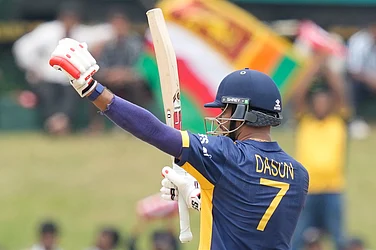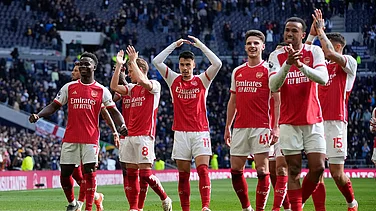Anticipation for today's India-Pakistan match has reached a fever pitch. The two Cricket Boards, possibly in coordination have released clips of players interacting with each other. This has sent fans into a tizzy. For ordinary cricket fans, love for the gentleman’s game transcends the hate mongers and the historical baggage of partition. Virat Kohli is a hot favourite in Pakistan. Babar Azam has admirers across India. In the past, Imran Khan was as much a hero in India as in Pakistan.
Cricket is part and parcel of India-Pakistan diplomacy. In 1987, when India conducted one of the largest peacetime military exercises code-named Brass-tacks in Rajasthan for five months (November 1986-March 1987) near the Pakistan border in Sindh, there was tension between the two countries and there was talk of an impending war. Military dictator Zia ul Haq decided to diffuse the situation by arriving in India on the pretext of watching an India-Pakistan cricket match. He met with prime minister Rajiv Gandhi and some of the tension dissipated. This was the first time that cricket diplomacy was used.
It is well known that BJP's Atal Bihari Vajpayee was keen on putting an end to the hostility between India and Pakistan. He was determined that his legacy as PM would be lasting peace among South Asia’s hostile neighbour. He tried his level best, first with the Lahore bus diplomacy with Nawaz Sharif, and later he also tangoed with Pervez Musharraf. During this time, he was keen to send an Indian cricket team to Pakistan to build goodwill. The move was opposed tooth and nail by deputy prime minister and home minister L.K.Advani, who prided himself on being the iron man of the BJP. The home ministry would plant daily stories that terror and cricket could not go together and that it was dangerous for Captain M.S.Dhoni and his team to travel to Pakistan as they would be the targets of terrorist groups. But Vajpayee insisted and the PMO prevailed. Vajpayee met Dhoni and his boys just before they left for Pakistan and told them that they should not just win the games but the hearts of the people. The Indian team got a heart-warming reception in Pakistan and Vajpayee is perhaps one of the most popular Indian leaders across the border.
Musharraf visited India in April 2005 to watch an India-Pakistan cricket match in New Delhi. His visit was at the invitation of Prime Minister Manmohan Singh. This was also an attempt at peace-making. During the World Cup 2011 semi-final clash between India and Pakistan, Singh invited Pakistan’s then-prime minister Yousuf Raza Gilani. Peace talks started again and Pakistan toured India in December 2012 for a T20 and three ODIs.
With all this history behind India-Pakistan cricket it is natural that the question arises will this be an ice-breaker? (But before people get carried away, India and Pakistan have always honoured ICC commitments. And they are playing in a neutral venue. ) Will the bonhomie lead to something more? Like a bilateral series and then a further opening up of relations between Asia’s arch-rivals?
Optimists point to the fact that despite the current hostilities, a LOC ceasefire that was finalised by the Director General of Military Operations (DGMO) of both countries in February last year, has continued to hold. But the hope that this would lead to a breakthrough was belied. Even the bare minimum of getting high commissioners of the two countries back to their positions has not happened. Yet when it comes to India and Pakistan nothing can be ruled out.
The last time a serious attempt at breaking the was on Christmas Day 2015 when Prime Minister Narendra Modi made an impromptu visit to Lahore to meet his counterpart Nawaz Sharif on his birthday. Modi was on his way back from Kabul. But Sharif and the military leadership were not on the same page.
The terror attacks that followed derailed the talks, starting from a strike at Pathankot airbase, the Pulwama suicide bomber that killed 44 Central Reserve Police officers and led to Uri counter-attack by India. Finally, when New Delhi decided to revoke Kashmir’s status and Imran Khan recalled his high commissioner from India, India followed suit. Relations ever since have been in a deep freeze.
A breakthrough in India-Pakistan ties appears unlikely at the moment. The political situation in Pakistan remains uncertain. Imran Khan the ousted prime minister is on the war path and his popularity since leaving office has soared. A coalition government headed by Shehbaz Sharif appears shaky and domestic politics is now the top priority. While it is well known that foreign policy is not in the hands of the civilian government, army chief General Qamar Javed Bajwa has been talking about peace in the region and establishing working relations with India. But Bajwa is retiring in November this year and much will depend on the attitude of the next military commander. Till the political situation in Islamabad stabilises perhaps with fresh elections, New Delhi will be in no mood for a serious conversation with Pakistan’s leaders.
However, never say never when it comes to India-Pakistan relations. Modi as we know is as keen as Vajpayee to charter a new path with Pakistan. Unlike Vajpayee, Modi’s control of the party apparatus is absolute. There will be no opposition within the BJP if Prime Minister Modi and home minister Amit Shah decide to talk about peace with Pakistan. However, now is not the time for cricket diplomacy or peace talks. That will have to wait for the political situation in Islamabad to stabilise.



























